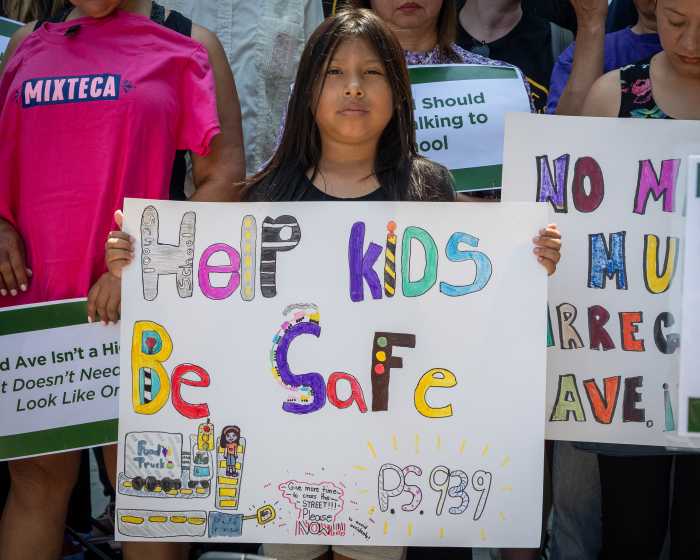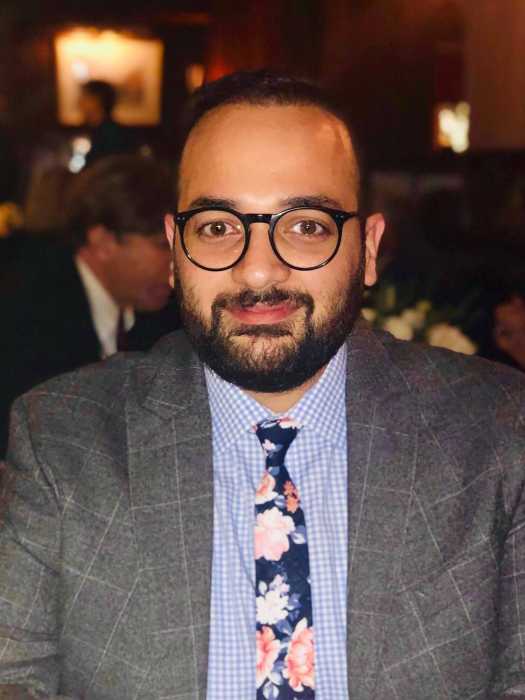West Side Colombian-American Democrat strives to win hotly contested borough race
In an interview with Gay City News conducted in May, long before the terrorist bombings in London brought everyday safety back to the forefront in the minds of New Yorkers, Carlos Manzano, a candidate for Manhattan borough president, started the discussion with his ideas on homeland security issues.
“Homeland security is a key issue in Manhattan,” the 38-year-old West Side Democrat said, first noting the economic impact of the September 11 attacks, before turning to a point about how universal the threat is. “Terrorism shows no discrimination whatsoever.”
The discussion that ensued was emblematic of the way in which Manzano, who speaks with a carefully measured intensity, approaches the borough presidency race. His campaign appeals are full of suggestions about new initiatives that can be launched out of that office—separate from the job’s formal duties—that he proposes to implement to make government work better and be more responsive to citizen needs.
Manzano explained that his campaign Web site spells out a five-point plan for better combating the threat of terror attacks in Manhattan—adding security committees to each of the local community boards for them to identify and mitigate specific neighborhood risks; launching a security unit in the borough president’s office; establishing a Web portal on the office’s home page for expediting citizens’ ability to access available resources; expanding borough-wide the Community Emergency Response Teams or CERTS already established in Battery Park City, Grammercy Park and Harlem; and establishing private and public sponsorship to implement realistic evacuation plans—and even drills—for high-rise residential and office towers.
In discussing his ideas on security, Manzano emphasized the computer expertise he developed in a variety of positions he’s held, including work in the 1980s with Commerzbank and more recently, beginning in 2001, as the assistant commissioner of Youth and Community Development responsible for the Beacons program that provides after-school programs for youth and adults. In that position, he managed a $32 million budget and supervised a staff of nearly 100.
Manzano’s emphasis on new initiatives in the borough president’s office addresses two important questions that this particular election contest poses. First, the voting public is not altogether clear on what the role of the borough president’s office is. With the decline in the scope of the office’s duties since a federal court in 1989 ruled that some of the more important citywide responsibilities of the office violated the one man-one vote rule—since boroughs of widely disparate populations had an equal voice—each candidate faces a challenge in convincing voters that they could materially improve their lives if elected. Being proactive in charting a vision for the office may be necessary to catch the voter’s attention.
That challenge is made more difficult this year by the size of the field. It is likely that the September Democratic primary ballot will include as many as ten candidates—including three members of the State Assembly, three members of the City Council and a former, longtime Council member.
Manzano’s credentials in public office are more modest. He has served as a Democratic Party state committeeman since 1994, which has given him experience in working with a wide array of elected Democratic officials and in brokering the party’s positions on a wide array of policy questions. In addition to working for the Department of Youth and Community Development, Manzano also worked for the Board of Education—reconfigured by Mayor Michael Bloomberg as the Department of Education—where he was involved in both instruction and computer management, and for the Board of Elections, where he oversaw a unit responsible for poll site access.
His previous experience in electoral politics came in early 1999, when he was one of five Democrats competing in a special election for the City Council seat in Chelsea vacated by Tom Duane when he entered the State Senate. Christine Quinn, a lesbian, won that election easily, but Manzano was a clear second, ahead of two well-known gay and lesbian candidates, Christopher Lynn, a transportation commissioner under former Mayor Rudolph Giuliani, and Aubrey Lees, who has served as a district leader and community board chair in Lower Manhattan. Both Lees and Lynn have endorsed Manzano in this race.
During his interview with Gay City News, Manzano was also eager to demonstrate his willingness to role up his sleeves on the growing problem of crystal meth addiction in the gay community. While endorsing the approach announced over the past several years by federal and state law enforcement agencies that puts considerable effort into arresting and prosecuting those selling the drug, Manzano said that it is important that police efforts not become a “gay profiling” situation.
He emphasized the importance of bringing gay groups—the Empire State Pride Agenda, Gay Men’s Health Crisis and individual community leaders—into the discussion.
“I would like to convene a task force including the gay community and law enforcement and me as the borough president, not a designee of my office,” he said.
Manzano spent considerable time on a popular theme in this year’s borough president race—the crisis of affordable housing in Manhattan. On this topic too he offered something of new twist.
“Everyone talks about affordable housing,” he said, “but the question is for whom?”
He noted that most set-asides required of developers seeking public approval to move ahead requires that 20 percent of units be reserved for low-income tenants making less than $25,000.
“But, 90 percent of the population is in the middle, with no safety net at all,” Manzano argued.
He said that set-asides in new residential construction should be staged from $10,000 all the way up to $140,000, pointing to the example of Manhattan Plaza, where he lives, where income criteria all the way up to $102,000 are considered in reserving units.
“That creates a model that works,” he said.
In talking about affordable housing, in particular, Manzano argued that the powers of the borough presidency are not inconsiderable—with the ability to introduce legislation into the City Council, exercise influence on city boards over planning, land use, zoning and the budget and in the appointment of half of all community board members in the borough who number in the hundreds.
Asked about the zoning restrictions developed incrementally under both Giuliani and Bloomberg that have sharply limited adult businesses in Manhattan—and were recently held up in court—Manzano voiced general support for barring significant build-up of such businesses in any one neighborhood.
“We want to protect freedom of expression,” he said, “but we also want to be aware of the concerns of seniors and of children going to school. What will concentration of such activities do? The code should be configured so that limitations on concentration are enforced.”
Manzano peppered the interview with examples of needs felt by a wide range of constituency groups Manhattan, but was insistent that the race would not be decided on the basis of ethnic, racial or identity politics.
“This is not a race of ethnicity or gender, but one of qualifications and ideas,” he said, before alluding to the ethnic divisions that marred the Democratic mayor runoff between former Public Advocate Mark Green and former Bronx Borough Pres. Fernando Ferrer in 2001. “I hope the mayoral race this year is not a sequel to 2001. Voters are turned off by ethnic animosity. When I go to the Latino community, they ask what are you going to do to improve my life.”
A native of Colombia, Manzano—who moved to Middle Village, Queens, with his family as a youth and has lived in Manhattan for 18 years—is one of three Latinos in the race, along with Puerto Rican Margarita Lopez, a Lower East Side city councilwoman, and Dominican-American Adriano Espaillat, a state assemblyman from Washington Heights.
The September ballot will also include at least two openly gay and lesbian candidates—Lopez and attorney Brian Ellner—and Manzano seemed comfortable responding to widespread speculation that he too is gay, even as he declined to answer directly.
“We saw what happened with Pres. Clinton,” he said. “I have no relationship in my life. I dedicate my life to public service, just like a priest or rabbi would, though of course, in the case of rabbis, they can marry.”
If Manzano has a natural base in the race, it is his Hell’s Kitchen neighborhood on Manhattan’s West Side. It is there that he tallied the votes that put him into the number two spot in the 1999 Council race. It is also the home of the McManus Democratic Club, his political base since the mid-1986 which he has served as president.
In a ten-person contest, with no run-off required for the candidate who wins a plurality on primary day, a strong geographic base of support cannot be discounted.
gaycitynews.com


































